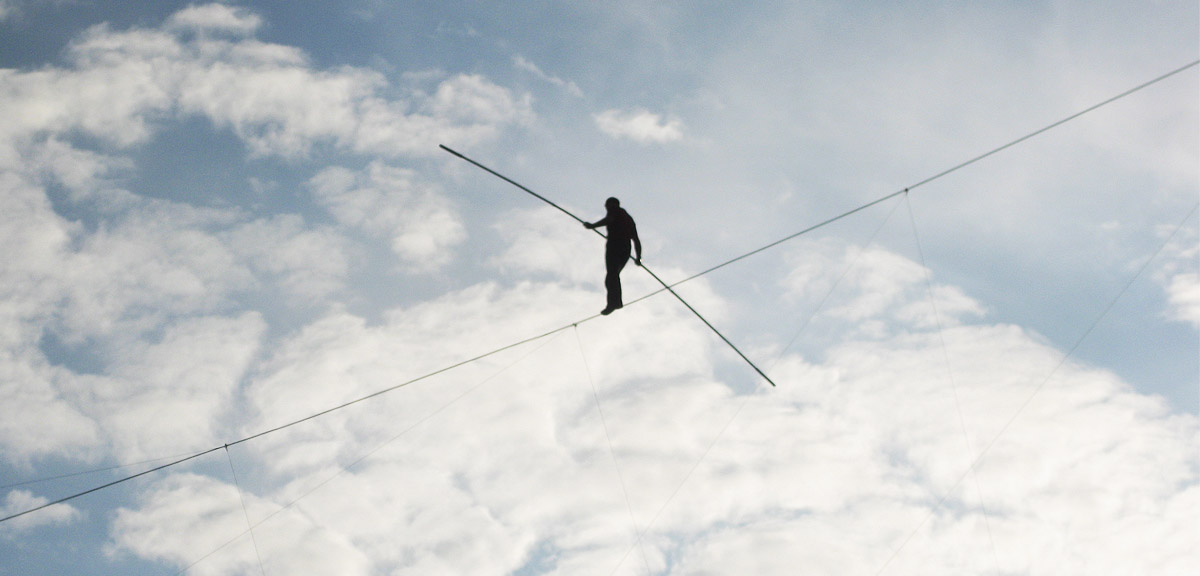
A Month of Poetic Acrobatics: 7 New Poetry Books to Read in September
Featuring Quan Barry, Ariana Benson, Saskia Hamilton, and More
Crossword sonnets, infected sonnets, golden spades, stanzas copped from John Donne—there is plenty of formal innovation and imitation to be found in this month’s roundup. But don’t be fooled. This is not simply a matter of poetic acrobatics: something in this month’s robust offerings just may take the top of your head off, or at least turn your head. Saskia Hamilton’s posthumous collection drops, along with remarkable debuts from Ariana Benson, Jesse Nathan, and Simon Shieh. “These poems are testimony. They testify against the master,” writes Shieh. “Can writing be a form of practice or preparation for death?” Hamilton asks. “#Amerikka, who’s earned / the coping ladder / out of trauma’s deep? The tourist or the tortured?” sings Martinez. Brace yourself and clear your favorite reading chair. (And please stay tuned for October and November roundups, hosted by poet and critic David Woo, who is kindly stepping in as guest columnist before I return in December.)
*
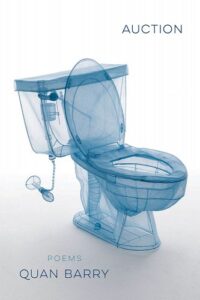
Quan Barry, Auction (Pitt Poetry Series)
A monk bows to an ATM machine, a refrigerator is recognized for its soul, and a speaker wonders about the inner life of, as per the title, a “Living Fossil, Living God,” i.e., the frilled shark, with its three-and-a-half-year gestation cycle and “its rows of teeth, a consciousness beyond mind / that watches what mind does, its sorrows….” Quan Barry’s seventh collection roams in tone and vantage as she tackles states of being in this contemporary world. In the middle sequence, “Das und Pocket Field Guide to Occupied Lands,” poems hang low on the page and bear titles such as “The Tears of these Gluten-eating Philistines, “The Bones of These Fundamentalist D-Bags,” and “The National Sport of These Degenerates,” which ends “Our ocean/ is for food and oil and refuse and conveyance, a vast nothingness to get across.” These punchy indictments, invisible cities of “reprobates” and “bottom feeders” give way to poems like “I am Pro-Living Because,” with its conclusion, “I believe the only absolute is love.”
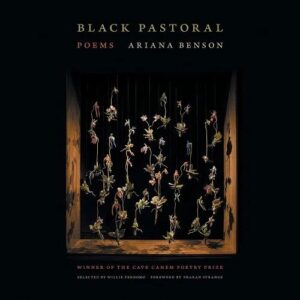
Ariana Benson, Black Pastoral (University of Georgia)
“Wasn’t it pestilence, six-legged blackness smotherin’ all / the white sky, that first made men into believers? / Or was it Moses himself, burnin’ bushes from the inside—and if so, ain’t I the flame?” From “Boll Weevil’s Theodicy” to the collection’s opening “Prologue: Love Poem in the Black Field,” Ariana Benson’s gorgeously crafted debut, Black Pastoral, breathes. It doesn’t matter what form she enters–or names, as with the “golden spade” a nod to the golden shovel that threads a Brooks poem through the center (in the vein of Cage’s mesostic)—the ear is there, leading and singing and excavating history through the love song, the resistance song, the poem as painting, while throughout, the natural world fields beauty and survival, holds “what festers in the brush: // the saltating maggots, the feasting / butterflies; their dripping / wings.” In Cruel Ripening, “To crush a summer thing into sweet gore—/ such field trip bliss” winds with sensory play, then turns to “questions of this land, its history, my play / upon it. This hand: made to pick in heat, made to find sugar / in low places” and later, lands, “What a sight I am / to those watching from earlier fields.” Benson, who describes herself as a “Southern Black ecopoet,” offers a meticulous and linguistically rich ecopoetics: “How right—to love in a field of our own making.”

Casie Dodd and C.T. Salazar, Mid/South Sonnets (Belle Point Press)
C.T. Salazar’s introduction cites this anthology as a “single moment in which poets hailing from or living in the South across a spectrum of race, class, gender, ability, and age all said here I am.” And, of course, they say it in a sonnet. Contributors address Texas borders (Mónica Teresa Ortis, Andrea Blancas Beltran); the banning of trans healthcare (CD Eskilson), and police violence (Aurielle Marie’s “sonnet while ziptied in a police wagon, fulton country.”) In continued expansion of the sonnet, find makalani bandele’s crossword sonnets (“a little bit of blackitolism revisited”) alongside T.K. Lee’s triptych of one-word sonnets and poems from Marcus Wicker’s ATlien series. The spirit of the book is echoed in the final lines of Jianqing Zheng’s ekphrastic “Abstract Duality”: “like a chalkboard / to be written / with meanings / living or dying / in the deep south // or about being or nonbeing / in the floating world.” Or there is Erin Hoover’s “Babycare” finale: “I may have been born a knife, but my daughter / won’t be a knife, nor its willing sheath.” Pick up this anthology to discover new-to-you voices in an underheard region of poets, for as Salazar reminds us, “A volta isn’t just a turn, but a transformation.”
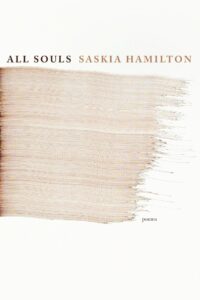
Saskia Hamilton, All Souls (Graywolf)
“She is dying, said the nurse. It was a Tuesday / in the new century. But not then––.” The staggering title poem of All Souls alone makes this final collection an essential and gutting read, one that reminded this reader of first encountering Donald Hall’s Without, in which he mourns his dying spouse, the poet Jane Kenyon. Of course, the dying, too, mourn their beloved, as they tackle the living grief of anticipated separation–what does it mean for a poet to rise to such a task? And what if the beloved is a young child? Saskia Hamilton transcends in this devastating final book that has, at its brutal core, her anticipated death as a mother of a young son: “The boy touches your arm in his sleep / for ballast. It’s warm in the hold. Between / ship and sky, the bounds of sight / alone, sphere so bounded.” This unbearable break of mother and son is paired with the knowledge—by both poet and reader—that a sharp mind will also be prematurely lost, for Hamilton’s intellect burns through these four fragmented poems. Meditating on a dead pocket watch the speaker both commands and queries: “Don’t turn back, / it’s the wrong way, is the relation of / chronology to history at all valuable here.”

Michael Martinez, Tarta Americana (Penguin Random House)
Out of the pandemic emerge “infected” sonnets, daily sonnets that J. Michael Martinez wrote—alongside of daily sestinas—in the summer of 2020, and then “infected” with words from white supremacist Greg Johnson’s The White Nationalist Manifesto, selected through bibliomancy and put through a procedure borrowed from Tom Mirovski’s instructions for using DNA to make nature poems. Each line of the original sonnets is followed by the shadowy “infected” line, which is indented and rendered in a gray text: these are “The Donna Sonnets,” an echo of the role of Donna, and her beloved, Ritchie Valens, the guiding presence of this collection. Valens is sometimes subject, but most vitally, audience in “Letters to Ritchie,” which allow the speaker to thread their lives, wrestling with not only witnessing a shooting as a teenager, but “breathing for him after he’d stopped whispering for help.” In “Angello fabrications” –prose poems meditating on the chorus of Valens’ “We belong,” Martinez continues to blur the lines of self: “& you’re your brother raising the bottle to your lips, gushing fluid gold down his throat, & you’re the butterflies bursting from the liquor, thrusting your wings around your breath, & you’re his words crawling into the air like wet wings….”
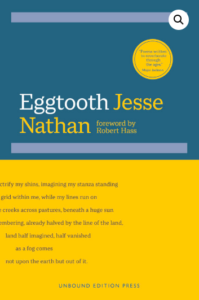
Jesse Nathan, Eggtooth (Unbound Editions)
John Donne’s ghost directs Jesse Nathan in his debut collection, telling him to “use me like an eggtooth, break the shell that shields you, let me be the germ” and to “[u]se my imbalanced device, half-medieval, to shuck frank death as you surge with goodbye.” Donne’s seven-line stanza is indeed the “germ” of much of this book, down to frequent triple rhymes, and Nathan delivers. The eye for the world around sharpens in these forms, bringing “Sunflowers like skinny men with rubberneck looks,” “the yarrow-strewn casket” and smoking “gravedigger with no sleeves” at a funeral, or the naked woman in a car behind: “naked and fulgent and diving, / and the pelicans cruising did not veer / and her breasts were flying, / and the froth became her hair.” Humor bustles beneath nuanced sonic play, while poems throttle sense of place from the Bay Area back to Kansas, childhood home and landscape of Nathan’s Mennonite mother. In a call home to “kin,” to Kansas, separation echoes: “his father might say that the starlings were mustering the pasture, they could murder if they wanted,” and the father holds the phone up for the train to echo back to the speaker, the distant son.
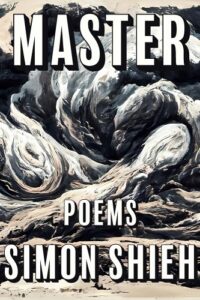
Simon Shieh, Master (Sarabande)
Simon Shieh’s Master is astonishing. In this collection selected, and introduced, by Terrance Hayes as the winner of the Sarabande Books Kathryn A. Morton Prize, Shieh approaches childhood trauma by weaving a series of interconnected lyrics that interrogate power and control. The “master,” the “he” of these poems, runs the martial arts academy where the speaker is a child student. Small gestures shape a trajectory: he “ties ropes around my wrists, blindfolds me” and moves my hand / to the left, moves my foot / to the right.” The master haunts the speaker’s dream world: “Reverence” opens, “The first night I dream of him / he pulls his fists out of my chest.” In “Master (Five Nocturnes), the I begs, “When I beg him to show me the night / sky, he slices its body open in front of me, spills / its insides onto the wooden table.” As the collection moves to the speaker’s competitive fighting in China, where his parents have moved him, the speaker stands against his competitor, and recounts, “I…give him / my most beautiful smile //My teeth at his throat / like a necklace of pearls….” To extract from this intricate tapestry of a book is to sell it short: read it. As the poet says in his brief and essential notes: “These poems are not about what happened to me; they are about the process of writing what happened to me.”
Rebecca Morgan Frank
Rebecca Morgan Frank's fourth collection of poems is Oh You Robot Saints! (Carnegie Mellon UP). Her poetry and prose have appeared in such places as The New Yorker, Ploughshares, American Poetry Review, and the Los Angeles Review of Books. She is an assistant professor at Lewis University and serves on the Board of Directors of the National Book Critics Circle. She lives in Chicago.



















